Proliferation is a process of cell division that can be observed from the side of the columnar epithelium and is considered final stage of the onset of inflammation.
This condition develops as a result of various factors, but in most cases it affects the tissues of the organs of the reproductive system in women. Pathology requires timely diagnosis and treatment, which prevents complications.
Record content:
- 1 Views
- 2 Symptoms
- 3 Reasons for the appearance
- 4 Diagnostics
- 5 When to see a doctor
- 6 Prophylaxis
-
7 Treatment methods
- 7.1 Medications
- 7.2 Folk methods
- 7.3 Other methods
- 8 Possible complications
- 9 Video about changes in columnar epithelium
Views
The pathological condition occurs in patients of different ages and can proceed in different ways depending on the characteristics of the organism and the presence of other diseases from the internal organs.
It is also worth noting that natural physiological processes and the period of the menstrual cycle are important. Depending on these features, cell proliferation can be suspended or more pronounced.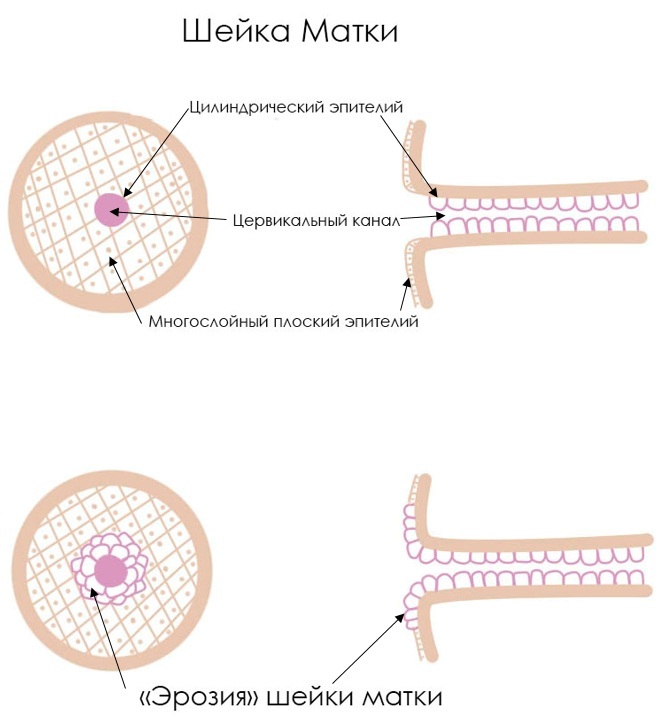
| Proliferation type | Peculiarities |
| Before menstrual bleeding begins | A natural physiological process that can be observed in the body of a healthy woman once a month. This is due to the preparation of cells for the upcoming exposure to blood and the multiplication of microorganisms, which is observed when the menstrual blood is retained in the vagina. Usually, the condition does not provoke complications if the woman uses the correct personal hygiene products and follows all the rules regarding washing the external genitals. It is also worth noting that in most cases there is no reason to see a doctor, and there are no negative symptoms. |
| With menopause | Cell proliferation during menopause can provoke unpleasant symptoms, but it is considered a fairly common disorder that is associated with an imbalance of sex hormones, namely a deficiency of estrogen, which maintains the health of the mucous membranes vagina. Usually, the patient develops discomfort, after undergoing treatment, the symptoms disappear or significantly weaken |
| During pregnancy | Cell proliferation during pregnancy may indicate a violation of the vaginal microflora, as well as the development of an inflammatory process. A woman may or may not feel discomfort, depending on the particular patient. If signs of inflammation are found, proper treatment is required |
| After childbirth | Depending on the severity of the course of labor, the degree of cell proliferation differs. It can be severe or mild, and is almost always accompanied by several clinical symptoms. It should be noted that inflammation during this period is considered a consequence of many reasons and necessarily requires treatment. |
| For various diseases of internal organs | The health of the columnar epithelium of the cervix and vagina largely depends on the health of the internal organs. That is why inflammation can be the result of somatic disorders. The features of its course also depend on the provoking factor and some other reasons. |
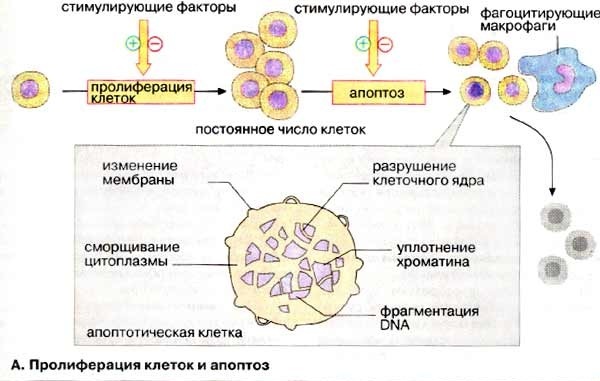
It should be noted that proliferation is considered a natural physiological process, so the process cannot always be considered a disease. In many cases, it does not require treatment, only observation of the patient is sufficient.
Given this nuance, the condition can be complicated and uncomplicated. In the first case, they talk about intensive cell division, which leads to the development of a disease. In the second case, the process does not lead to the development of complications and ends on its own without provoking any symptoms.
Additionally, experts identify proliferative processes in the vagina and cervix.
It is also worth noting that cervical proliferation can be of several types:
- The hyperplastic form occurs with a benign course of pathology, for example, with erosions, polyps and some other pathologies. It usually results from hormonal disorders.
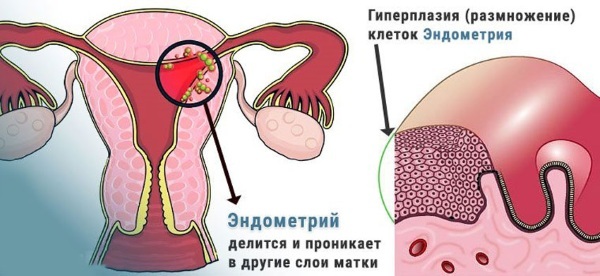
- The inflammatory form occurs when the mucous membranes are affected by bacteria of various types, for example, with urethritis or cystitis
- The post-traumatic type often develops after childbirth or any surgical interventions on the organs of the reproductive system.
It is important to remember that in many cases, detection of proliferation is considered normal.
In almost every woman, the process of proliferation proceeds in several stages. At the initial stage, there is an intensive multiplication of cells, which can be detected during a diagnostic examination. In this case, symptoms are usually absent, especially in the case when the condition is physiological and is not provoked by various pathologies.
At stage 2, symptoms of inflammation may appear if proliferation is associated with any somatic disorders. At stage 3, the process ends. In some patients, the state of the mucous membrane and microflora of the vagina is normalized, in others it turns into an inflammatory process.
Symptoms
Proliferation of columnar epithelium is a condition that almost always proceeds imperceptibly, that is, there are almost no external signs. A woman can be active, she has an appetite. However, there are cases when the condition is accompanied by pallor of the skin, a rash, and a deterioration in mood.
With a complicated course of the disease, there is a violation of the menstrual cycle, the appearance of brown or other colored discharge from the vagina. In this case, the discharge does not depend on the menstrual cycle and can persist for several weeks.
It should be noted that with some types of proliferation resulting from hormonal imbalance, there is pain in the lower abdomen, discomfort during sexual intercourse, urination.
The menstrual cycle is severely disrupted, periods become painful and long or short. Some women experience the disappearance of menstrual bleeding for several months. It is noted that proliferation significantly increases the risk of developing inflammatory bacterial pathologies of the genital organs.
Many women note the appearance of atypical discharge, an unpleasant odor. Some people develop cystitis or urethritis, accompanied by pain when urinating, discomfort in the lower abdomen, it is worth noting that the symptoms depend on the specific disease and the characteristics of the organism of each women.
Reasons for the appearance
Proliferation of columnar epithelium is a condition that can be associated with many factors.
The most common reasons are:
- Physiological natural factors include menstruation, pregnancy, menopause, and postpartum recovery. During this time, proliferation is rarely threatening.
- Hormonal disorders of various origins.
- Infectious pathologies of various forms and severity.
- Injuries to the mucous membranes of the vagina and cervix.
- Violation of the rules of personal hygiene, constant use of tampons during menstruation.
- Wearing uncomfortable tight synthetic underwear.
- Minimally invasive and extensive operations on the vagina, uterus or cervix, performed through the vagina.
- Damage to the mucous membranes by aggressive medications in the form of tablets or suppositories.
- Sexually transmitted diseases.
- Immunodeficiency states.
- Violation of the microflora of the vagina as a result of the use of aggressive personal hygiene products on an ongoing basis.
- Viral lesions of the mucous membranes.
These and other factors can provoke the development of proliferation and the transition to a complicated form.
Diagnostics
The condition is fairly easy to diagnose using several methods.
The following methods are considered the most effective:
- Gynecological examination is carried out in public clinics free of charge and helps to assess the big picture. During the examination, the doctor uses a gynecological mirror, evaluates the color of the mucous membranes, notes the presence or absence of signs of inflammation. After that, he prescribes other methods to help get more information about the pathology.
- General and biochemical blood test costs about 300-500 rubles. It is carried out in a government clinic and is considered effective in assessing the general condition of the body. The method is an indispensable element of diagnosis, it helps to identify common signs of inflammation and other abnormalities.
- Blood analysis to determine the level of sex hormones is also considered a mandatory examination method. It allows you to identify the alleged cause of the violation. Diagnostics is carried out in specialized laboratories, it costs about 1200-2500 rubles. depending on the patient.
-
Colposcopy - a method for examining the mucous membranes of the vagina and cervix, which is considered the most effective today. During manipulation, the tissues are examined using a special colposcope device, signs of proliferation and possible complications are detected. The method is carried out in each clinic, its cost is about 500 rubles.
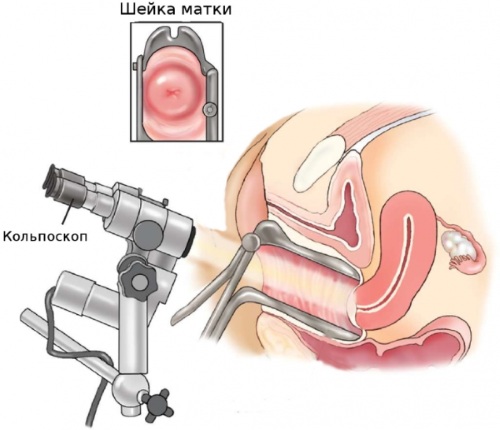
-
Cytological examination is also considered one of the most effective diagnostic methods. To do this, the laboratory examines a tissue sample taken from the vagina during a colposcopy. The result helps to identify the pattern of proliferation. The cost of diagnostics is about 500-700 rubles, they are carried out in public and private clinics.
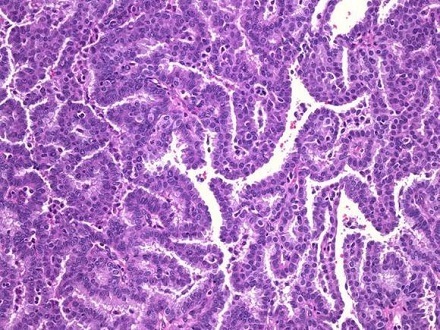
Proliferation of columnar epithelium under a microscope - Ultrasound Is another effective method that helps to see deviations from the ovaries, tubes and uterus. It is carried out in specialized offices and costs about 300-500 rubles.
Comprehensive diagnostics allows you to accurately determine the degree of proliferation and detect concomitant deviations. The most effective is colposcopy, cytological and ultrasound examination.
When to see a doctor
Proliferation seen from the columnar epithelium can be safe. This condition does not require treatment. However, in case of revealing signs of an inflammatory process, as well as malignancy of cells, you should immediately consult a doctor for a comprehensive examination.
The gynecologist is engaged in the treatment. It is also worth remembering that if abnormalities are found on the part of the uterus and appendages or hormonal background proliferation can become malignant, therefore it is required to visit a doctor and undergo examination.
Prophylaxis
It is not so easy to prevent proliferative processes. However, adherence to simple rules will help reduce the likelihood of a condition transitioning into a complicated form. You should have a permanent and previously examined sexual partner in order to exclude the risk of various disorders from the vaginal mucosa.
It is important to follow the rules of personal hygiene, to regularly carry out the toilet of the external genital organs using gentle means. In addition, it is important to wear adequately sized underwear made from natural fabrics.
An important role in prevention is played by the absence of hypothermia of the pelvic organs, which can provoke inflammation and other complications. In addition, you should regularly visit a doctor, undergo an examination. It is especially important to follow this recommendation for women who have chronic pathologies of the organs of the reproductive system.
During pregnancy, during menopause and during menstruation, compliance with the rules of personal hygiene is of paramount importance, since many complications arise precisely when they are violated. In the event of a hormonal imbalance and a violation of the vaginal microflora, you should not use drugs without first consulting a doctor.
All infectious and inflammatory diseases of the pelvic organs should be treated promptly and under medical supervision. Compliance with simple rules will significantly reduce the risk of pathology becoming a complicated form, and will also improve the health of the reproductive system.
Treatment methods
Proliferation of columnar epithelium is a condition that does not always require treatment. However, the decision on the appointment of certain drugs is made only by a doctor. In therapy, folk remedies, standard drugs and other methods are used, depending on the characteristics of its course.
Medications
Usually, conservative therapy helps to eliminate the manifestations of the disease, but does not eliminate its cause.
The following medications may be used depending on the symptomatology:
- Ibuprofen - anti-inflammatory and antipyretic medication, which is used to eliminate pain and suppress the process of inflammation. The tablets should be taken 1 piece 2 times a day for 5-7 days. The medicine alleviates the condition, if the pathology is accompanied by pronounced manifestations, it is considered very effective. Price - from 120 rubles.
-
Amoxiclav - a broad-spectrum antibacterial medication, characterized by high efficiency and assigned to patients with proliferation, which is accompanied by inflammation and bacterial infection. Tablets are taken 1 piece 2 times a day for 7-10 days, depending on the severity of the condition. The drug helps to relieve acute symptoms, but is usually used in combination with topical agents that enhance its effect. The price of tablets is from 230 rubles.
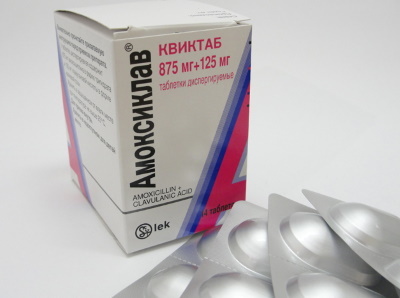
- No-shpa - an antispasmodic medication used for a disease that occurs as a result of damage to the uterus and appendages. At the same time, women often talk about spasmodic pains in the lower abdomen, so the remedy is considered very effective in this case. The patient is prescribed 2 tablets 2 times a day for 1-2 weeks. Price - from 170 rubles.
- Ketorol - an anesthetic and anti-inflammatory medication that is highly effective and helps to cope with severe pain when the pathology is accompanied by complications. Tablets are taken 2 times a day, 1 piece, and the course lasts no more than 5 days. Price - from 110 rubles. for 10 tablets.
- Hexicon - effective and relatively safe suppositories, which are used to destroy bacteria in the vagina that provoke an inflammatory process and increase proliferation The course of treatment with the drug lasts 10 days, the woman should insert 1 candle into the vagina before bedtime and after the preliminary toilet of the external genitalia organs. The cost of the medicine is approximately 300 rubles.
- Miramistin solution used to irrigate the mucous membranes of the vagina. It is highly effective in killing bacteria. The procedure should be carried out at bedtime for 10 days. For irrigation, a special non-concentrated solution is produced, but only a doctor should prescribe it. The price of the product is from 130 rubles.
- Tsi-klim - a herbal preparation based on phytoestrogens, which allows to normalize the amount of estrogen in the blood at the onset of menopause. The tool helps to improve the microflora of the vagina, normalizes overall health and prevents the development of complications. It is necessary to take it 1-2 tablets 3 times a day for 2-3 months. The drug is very effective, but the result can only be obtained with the passage of a long course. Price - from 250 rubles.
-
Viferon - suppositories with antiviral action, which are actively used for the defeat of the mucous membranes by viruses. A viral infection can lead to intense cell proliferation, so suppression of its pathogen leads to recovery. The drug is considered one of the most effective. The course of therapy lasts 10-20 days, during which the patient should inject 1 suppository into the rectum before bedtime. Price - from 600 rubles.
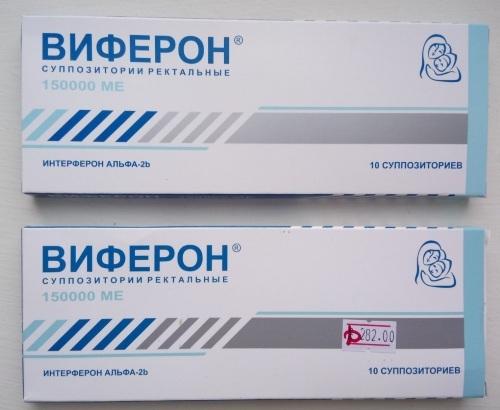
In each case, the treatment regimen, dosage and duration may differ. It is important to remember that all of the listed medicines are not used at the same time. For each patient, the list of funds is compiled individually.
Folk methods
In some cases, experts allow the use of traditional medicine recipes to alleviate the condition.
Douching with chamomile infusion helps to normalize the vaginal microflora and prevent the spread of the inflammatory process. For 1 liter of boiling water, you need to take 20 g of dry grass, leave to infuse for 1 hour. After that, filter the composition and use it for douching before bedtime. The course of therapy lasts 10 days, a new portion of the infusion should be prepared daily.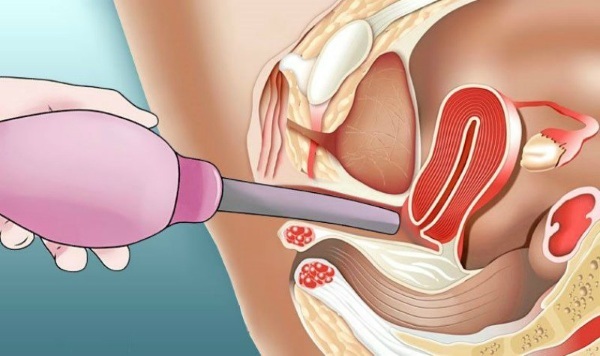
Garlic juice swabs are also considered a common treatment for bacteria and inflammation. It is necessary to moisten a cotton swab in freshly squeezed juice and insert into the vagina for 1 hour. Repeat daily for 1 week.
It is worth remembering that the effectiveness of folk remedies has not been proven by specialists, so each patient uses them at her own discretion. It is nevertheless recommended to obtain the approval of the attending physician.
Other methods
Proliferation of columnar epithelium is a disease that can be treated surgically with the progression of the condition, the transition benign cells into malignant ones, as well as the displacement of the focus of cell proliferation in the upper parts of the cervical canal or even in uterus.
In this case, the procedure for removing pathological foci is carried out, followed by a course of treatment with the use of immunostimulants, antibiotics, anti-inflammatory and other agents.
The essence of the operation is the excision of pathological foci after preliminary local or general anesthesia. In each case, the size of the lesion is different, so the method of anesthesia and tools for excision of the lesion may be different. After the intervention for 1-2 weeks, the patient is in the hospital under observation and receives medications.
The rehabilitation period can last up to 4-6 weeks, but the patient spends the rest of the time at home, following the doctor's recommendations.
Possible complications
With proliferation, treatment is not always required, but with its malignant course, the lack of therapy can lead to complications:
- Aggravation of the inflammatory process.
- Attachment of a severe bacterial infection.
- The spread of inflammation to the bladder, urethra, uterus and appendages.
- Penetration of the altered epithelium into the cervical canal and uterus.
- Malignancy of epithelial cells.
- Cervical cancer.
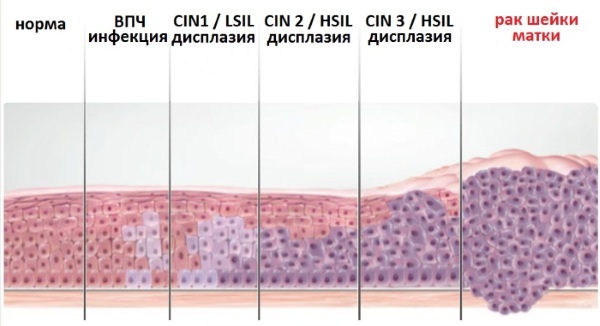
- Formation of polyps.
- Endometritis and endometriosis.
In the absence of therapy at an advanced stage, when the complication becomes severe, the likelihood of death increases.
Proliferation is considered a natural physiological process, can be observed from the side of the columnar epithelium and does not always indicate a serious illness. This condition can be a response to natural processes in the body, but it can provoke complications. That is why, when identifying such a sign, it is important to send a woman for a comprehensive examination.
Video about changes in columnar epithelium
Intraepithelial neoplasia of columnar epithelium:



